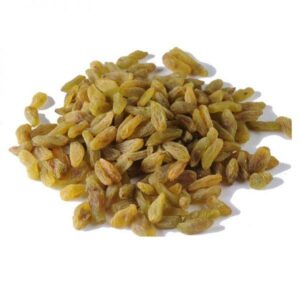
Can Diabetics Eat Raisins?
Understanding the Sweet Treat’s Impact on Blood Sugar
Raisins are a popular snack enjoyed by many, but for individuals with diabetes, the question arises: can diabetics eat raisins? This article explores the nutritional benefits of raisins, their glycemic index, and how they can fit into a diabetic diet. Can Diabetics Eat Raisins?

Green Raisin Jumbo
The Nutritional Profile of Raisins
Raisins, which are dried grapes, offer several nutritional benefits. They are rich in essential vitamins and minerals, including:
- Fiber: Raisins contain a good amount of dietary fiber, which aids digestion and helps regulate blood sugar levels.
- Antioxidants: They are packed with antioxidants, which help combat oxidative stress and inflammation in the body.
- Natural Sugars: Raisins are naturally sweet, with a high concentration of sugars, primarily fructose and glucose.
Glycemic Index of Raisins
The glycemic index (GI) measures how quickly a food raises blood sugar levels. Foods with a high GI can cause spikes in blood sugar, while those with a low GI have a slower, more gradual effect. Raisins have a moderate GI, typically ranging from 64 to 75, depending on the variety. This means that while they do contain sugars, they may not significantly elevate blood sugar levels when consumed in moderation.
Can Diabetics Include Raisins in Their Diet?
Yes, diabetics can include raisins in their diet, but moderation is key. Here are some important considerations:
Portion Control
Since raisins are calorie-dense and high in natural sugars, it’s crucial for diabetics to practice portion control. A small serving, such as one ounce (about 60 raisins), can be a healthy addition to meals or snacks without significantly impacting blood sugar levels.
Pairing with Other Foods
Combining raisins with foods that have a low glycemic index can help mitigate their impact on blood sugar. For example, adding raisins to a salad with leafy greens, nuts, or cheese can create a balanced meal that offers fiber and protein, promoting stable blood sugar levels.
Monitoring Blood Sugar Levels
As with any dietary change, it’s essential for diabetics to monitor their blood sugar levels after consuming raisins. This can help individuals understand how their bodies react to raisins and adjust their intake accordingly.
The Benefits of Golden Raisins
Health Benefits of Raisins for Diabetics
Incorporating raisins into a diabetic diet can provide several health benefits:
- Improved Digestion: The fiber in raisins aids in digestion and can help prevent constipation.
- Heart Health: Raisins are low in sodium and contain potassium, which can help lower blood pressure and reduce the risk of heart disease.
- Energy Boost: The natural sugars in raisins offer a quick energy boost, making them an excellent pre-workout snack. Can Diabetics Eat Raisins?
Understanding the Sweet Treat’s Impact on Blood Sugar
Raisins are a popular snack enjoyed by many, but for individuals with diabetes, the question arises: can diabetics eat raisins? This article explores the nutritional benefits of raisins, their glycemic index, and how they can fit into a diabetic diet. Can Diabetics Eat Raisins?

Green Raisin Jumbo
The Nutritional Profile of Raisins
Raisins, which are dried grapes, offer several nutritional benefits. They are rich in essential vitamins and minerals, including:
- Fiber: Raisins contain a good amount of dietary fiber, which aids digestion and helps regulate blood sugar levels.
- Antioxidants: They are packed with antioxidants, which help combat oxidative stress and inflammation in the body.
- Natural Sugars: Raisins are naturally sweet, with a high concentration of sugars, primarily fructose and glucose.
Glycemic Index of Raisins
The glycemic index (GI) measures how quickly a food raises blood sugar levels. Foods with a high GI can cause spikes in blood sugar, while those with a low GI have a slower, more gradual effect. Raisins have a moderate GI, typically ranging from 64 to 75, depending on the variety. This means that while they do contain sugars, they may not significantly elevate blood sugar levels when consumed in moderation.
Can Diabetics Include Raisins in Their Diet?
Yes, diabetics can include raisins in their diet, but moderation is key. Here are some important considerations:
Portion Control
Since raisins are calorie-dense and high in natural sugars, it’s crucial for diabetics to practice portion control. A small serving, such as one ounce (about 60 raisins), can be a healthy addition to meals or snacks without significantly impacting blood sugar levels.
Pairing with Other Foods
Combining raisins with foods that have a low glycemic index can help mitigate their impact on blood sugar. For example, adding raisins to a salad with leafy greens, nuts, or cheese can create a balanced meal that offers fiber and protein, promoting stable blood sugar levels.
Monitoring Blood Sugar Levels
As with any dietary change, it’s essential for diabetics to monitor their blood sugar levels after consuming raisins. This can help individuals understand how their bodies react to raisins and adjust their intake accordingly.
The Benefits of Golden Raisins
Health Benefits of Raisins for Diabetics
Incorporating raisins into a diabetic diet can provide several health benefits:
- Improved Digestion: The fiber in raisins aids in digestion and can help prevent constipation.
- Heart Health: Raisins are low in sodium and contain potassium, which can help lower blood pressure and reduce the risk of heart disease.
- Energy Boost: The natural sugars in raisins offer a quick energy boost, making them an excellent pre-workout snack. Can Diabetics Eat Raisins?